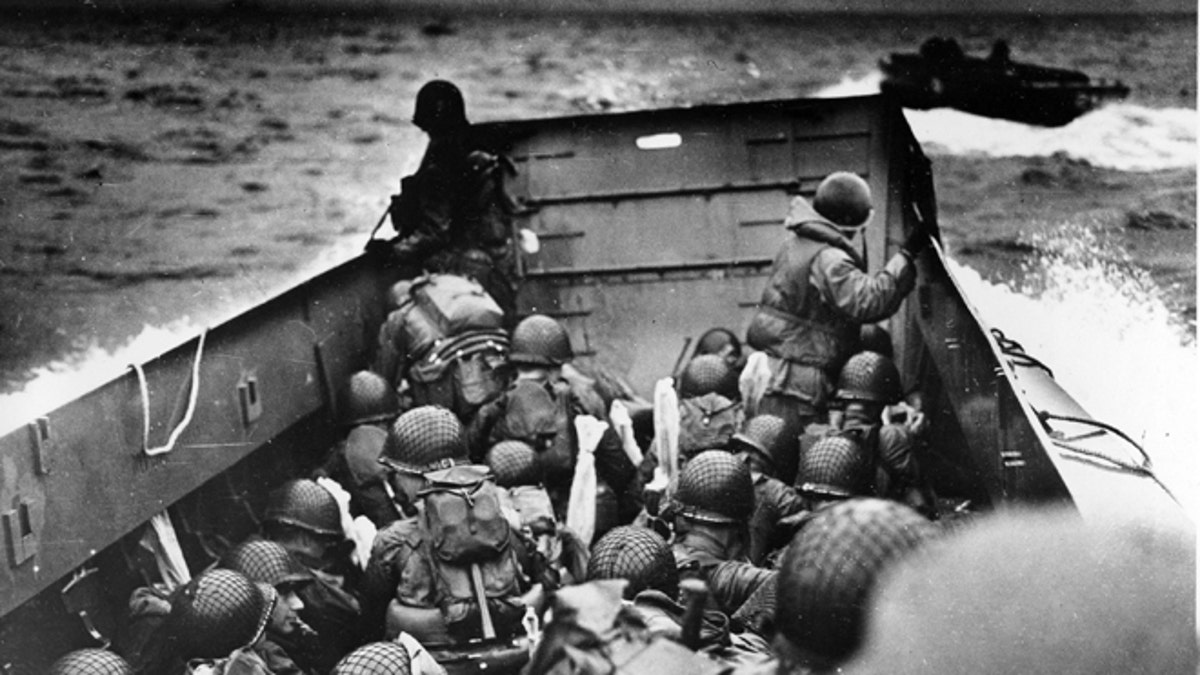
FILE - In this June 6, 2014 file photo, allied troops crouch behind the bulwarks of a landing craft as it nears Omaha Beach during a landing in Normandy, France. (AP Photo/U.S. Coast Guard, File)
The 70th anniversary of D-Day is a time of pride, gratitude and fear. Pride that the generation of ’44 had the courage to storm across the English Channel and take the Nazis’ Fortress Europa. Gratitude that their self-sacrifice has helped make it possible for us to enjoy 70 years of relative peace and prosperity. Fear that, because there is no end of war, we will one day be called upon to suffer it all again – and our soft and peaceable selves will have to prove equal to the task.
Sadly, there are few veterans of D-Day left. As a result, June 6, 1944, has gone from memory to legend. The anniversary has become a photo-op for politicians and an opportunity for summit meetings. The pageantry is stirring, the photos crisp and the kaleidoscopic shift of alliances instructive: Who, for example, can keep from raising an eyebrow at the thought of French President Hollande’s separate dinners for Presidents Obama and Putin? But all this has no more to do with the genuine significance of D-Day than does one of Normandy’s four-star restaurants.
[pullquote]
When it comes to D-Day’s real lessons, Caesar’s Gallic Wars, with its timeless and terrible tale of battlefield slaughter, is more to the point. Those lessons are: a major war is real, it takes hard work and good fortune for the good guys to win, and we might not know a “good war” when we see one.
Nowadays, sitting in the security of America, it’s hard to imagine that anyone could launch a major war. But history suggests otherwise. The past has always had leaders fierce enough to pull the trigger if they think it will achieve their goals, even if they risk a major conflict. It’s not difficult to imagine certain leaders doing so today in one of the world’s trouble spots such as East Asia, the Middle East or perhaps even Eastern Europe. The result, through blunder or bloody-mindedness, is terrible to contemplate.
The legend of D-Day suggests that the good guys always win, but that doesn’t do justice to the risks that the invaders took or the chance of failure. If the Allies’ deception plan hadn’t worked so well or if the German response had been more decisive, the invasion might have failed – or at least caused far more Allied casualties. Nor does the legend take into account the contribution of the one ally that was no good guy – the Soviet Union, without whose bloody victories in the East the Germans might well have been strong enough in the West to stop any invasion attempt. But you don’t always get to choose your allies, and victory sometimes takes a devil’s bargain.
The myth of America’s World War II is that it was a good war supported by the whole country, unlike such divisive conflicts as Vietnam or Iraq. Yet three years before D-Day, in June 1941, the majority of Americans opposed entry into the Second World War. It took the attack on Pearl Harbor by Japan and a declaration of war on the United States by Germany to convince the public. Those events didn’t come out of the blue but followed years of rearmament and political persuasion by the Roosevelt administration at home.
Abroad, the administration provided military support for Britain and engaged in all-but-acts of war against Germany (American warships and airplanes escorted British convoys in the Atlantic) and against Japan (an oil embargo).
If the American people supported the war with whole hearts when it came, it was only because the government patiently laid the groundwork while letting the Axis powers wreak years of havoc.
There’s no such thing as a good war, only difficult choices in an imperfect war. Wise leaders make it their job to persuade the public before they ask them to make a terrible sacrifice.
The ideal, of course, is to prevent another D-Day from ever being necessary. To that end, our leaders need to maintain the peace. That in turn will require wise diplomacy, constant engagement with the world and a strong military defense to deter aggressors, all based on a solid knowledge of the past. Otherwise, events like D-Day will become all too real again.
